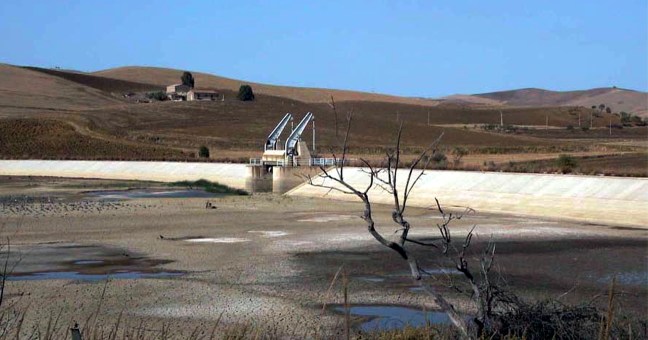Crisi idrica, la mappa degli invasi
Il flagello della siccità: lo stato attuale di capienza idrica degli invasi in Sicilia, tra Fanaco, Garcia, Prizzi, Pozzillo, Ancipa, Castello e Cimia.
Lo stato di salute degli invasi in Sicilia è terminale. Un miracolo per la sopravvivenza sarebbe la pioggia. E le cure palliative sono in corso, tra scavi di pozzi, sfruttamento di sorgenti e tubature ovunque zampilli acqua. Maggiore preoccupazione di morte solleva l’invaso Fanaco, che serve le province di Agrigento e Caltanissetta, e il cui progressivo prosciugamento è stato la causa per la quale Siciliacque già a gennaio e poi a marzo ha razionato drasticamente le forniture, innescando la crisi. Secondo l’Autorità di bacino adesso il Fanaco contiene poco più di un milione di metri cubi d’acqua, rispetto agli oltre 20 milioni autorizzati. Nel mese di giugno degli anni precedenti sono stati contenuti molto spesso oltre 18 milioni di metri cubi d’acqua. Solo nel 2021 il volume idrico si ridusse a poco più di 8 milioni. La diga Garcia, che rifornisce le coltivazioni di Santa Margherita, Montevago, Poggioreale, Salaparuta e Contessa Entellina, ha quasi sempre accolto circa 60 milioni di metri cubi d’acqua. Attualmente ve ne sono meno della metà. Si tratta di uno dei perni dei sistemi irrigui del consorzio di bonifica Agrigento 3 e del consorzio Trapani 1. Per compensare la mancata erogazione della diga Garcia, il commissario delegato per l’emergenza idrica, Dario Cartabellotta, ha disposto che 2 milioni di metri cubi del lago Arancio, tra Sambuca, Santa Margherita e Sciacca, potranno essere consegnati agli agricoltori del consorzio di Trapani 1, e che 8 milioni di metri cubi saranno utilizzabili per irrigare. Non versa in condizioni migliori l’invaso Prizzi, nel Palermitano, con 3 milioni di metri cubi rispetto ai 7/8 degli anni trascorsi. Ancora peggio, e di tanto, è la diga Pozzillo, in provincia di Enna: rispetto ai 90 milioni di metri cubi del 2019, attualmente ne sono presenti meno di 5. A testimonianza del disastro di oggi, si ricorda che negli anni precedenti molto spesso vi è stata più acqua del volume autorizzato. Si tratta di un invaso che serve 1.500 ettari coltivati prevalentemente ad agrumi, tra Regalbuto e Troina. Gravemente malato è anche l’invaso Ancipa, a servizio delle province di Enna, Messina e Catania, e che al momento accoglie circa 8 milioni di metri cubi rispetto ai 20/26 milioni degli anni precedenti. E poi è in disperato affanno la diga Castello, in provincia di Agrigento, con poco più di 8 milioni di metri cubi, a fronte dei circa 20 degli anni scorsi. Meno ancora la diga Cimia, nel Nisseno, con 3 milioni di metri cubi a fronte dei 5/8 degli anni precedenti. Per rimediare alla mancanza dell’acqua in terra piovuta dal cielo, la Regione intende ricorrere all’acqua del mare da condurre a terra. Per ripristinare i tre dissalatori di Gela, Porto Empedocle e Trapani è stato annunciato un investimento di 90 milioni di euro, ovvero quanto servirebbe per riattivare le attuali tre ‘cattedrali nel deserto’, criminalmente abbandonate all’incuria e al degrado. A Porto Empedocle il dissalatore, progettato sotto Totò Cuffaro, è costato 11 milioni di euro. E’ stato capace di fornire 3 milioni di metri cubi d’acqua all’anno. Poi sotto Raffaele Lombardo è stato spento per gli elevati costi di gestione.
teleacras angelo ruoppolo

